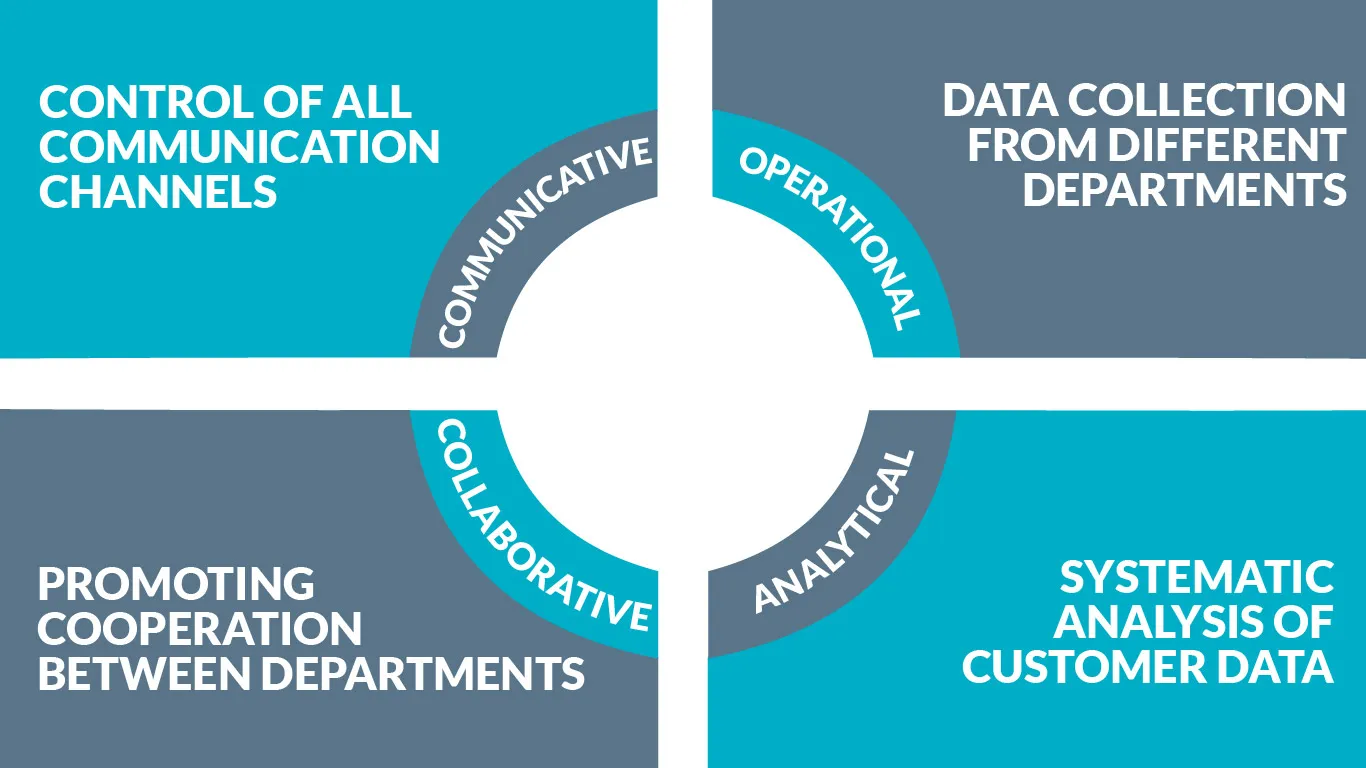CRM and ERP Systems: Which Solution
is the right one?
is the
Searching for a software system that combines the data streams and isolated solutions 🏝️ in the company, you come across both ERP and CRM software. The question then usually arises: what is the difference between the two software systems and which solution is the right one?
CRM and ERP: Overlaps, but different Focuses
There is often confusion about the similarities and differences between CRM and ERP systems. Even though the functionality of the two software solutions is increasingly overlapping today, their focuses are fundamentally different. However, both software systems have in common that they centralize data and processes in the company. This enables a better overview and more efficiency and thus fulfills the basic prerequisite for process automation.
CRM Systems: Customer Relationships take Center Stage
A Customer Relationship Management System (CRM system) records and manages all customer contacts and data in the company. This software primarily supports the work of the sales, marketing and business development departments. CRM software helps companies to establish contacts with potential customers and to maintain and deepen the business relationship with existing customers.
A CRM system unifies customer-related processes and thus increases efficiency in the company. The functions of a typical CRM system include, for example, lead management, creation of email campaigns, self-service support, automation of support and ticketing. Furthermore, customer information can be stored, organized and tracked. The functionality for creating and processing quotations, orders and invoices is also part of most CRM solutions today.
In addition, a CRM system today must fulfill high requirements in terms of mobility. After all, sales employees are on the road relatively often.
An example of a popular CRM system is Microsoft Dynamics 365 CRM .

ERP Systems: Efficient Operational Management is the Focus
Enterprise Resource Planning Systems (ERP systems) primarily combine data and processes that take place in the backend - i.e. in departments that do not directly face the customer. These include manufacturing, warehousing, purchasing and accounting. The fundamental aim of ERP systems is to improve collaboration within the company and thereby reduce costs.
This is achieved by integrating department-specific isolated solutions within the company. As in many companies the processes that run in the background are much more extensive than the processes that directly affect customers, ERP solutions are generally more extensive than CRM solutions. There are also usually more add-ons and other extensions - from the ERP vendor or its partners - available for an ERP system.
ERP Systems reduce Downtime in Production
One of the important tasks of ERP systems is to reduce or prevent delays and production downtimes. For example, if certain parts in a production area are coming to an end, the corresponding data and information is automatically and promptly available to other departments. Or the warehouse can reschedule at short notice and make the required parts available, which were originally intended for another production area.
Most ERP systems today also have software components (i.e. modules) that cover typical classic CRM functionality. For example, the functionality for marketing and sales.
However, the CRM performance of these ERP modules is limited compared to fully-fledged CRM systems.

CRM and ERP Systems: the Roots determine the Direction of Development
ERP systems developed from financial accounting software starting in the 1980s. Gradually, new modules in related areas and additional functionalities were added. And in the course of the 1990s, the modern ERP systems were created in this way, which today contain several specialist modules in the standard version. The ERP vendors or their partners usually offer additional software modules to choose from, which extend the standard range of functions.
The beginnings of today’s CRM systems also date back to the 80s of the last century. However, they go back to software for contact management. The cloud era for CRM software began around the year 2000, when the company Salesforce introduced the first significant SaaS CRM solution.
CRM or ERP Software: which Solution should you implement first?
When trying to determine whether a CRM or an ERP system is the right solution for your company, you should consider your current needs and their future development. If you find that customer relationship management in your company is not likely to require a lot of resources, a good ERP system will probably be sufficient.
This means ERP software that already has solid basic CRM functionality in the standard version, among other things. Ideally, this basic functionality can be further expanded by add-ons provided by the ERP vendor or its partners. An ERP solution that largely fulfills this criterion is Dynamics 365 Business Central, for example.
Another important point in favor of using the CRM module(s) of the ERP system to manage customer relationships is the shared database that all ERP modules access. In this case, you always have the current data from other ERP modules at your disposal and you may save yourself time-consuming integration work.
Manufacturing Companies: well served with an ERP Solution
Manufacturing or trading companies are usually interested in improving the management of processes throughout their organization, so the implementation of an ERP system is appropriate in most cases. The need for a fully-fledged CRM solution only arises later in such companies, if at all, after a certain company size and process complexity has been reached. For example, a contract manufacturing company that produces preliminary products for a small number of customers with whom it works on a long-term basis is highly unlikely to need a stand-alone CRM system.
Of course, a complete CRM solution can be considered for companies whose focus is on production. For example, if the number of customers and their needs increase over time and become more diverse. Or if the company aims to build a large and complex sales organization. For example, if several sales subsidiaries are to be established and operated at home and abroad.
Companies with a strong Customer Focus: a CRM System is the right Choice
However, there are companies whose business model is strongly focused on customer relationship management from the outset. Such companies are often based in the service sector. Production and warehouse management play no or a comparatively minor role in these companies. Accounting may also have been outsourced to an external service provider. In this case, the implementation of a CRM system often makes more sense than the implementation of an ERP solution.
Determine the right Time for Implementation
The time to decide to implement CRM or ERP software often goes hand in hand with the realization that the existing individual solutions in the company have reached their limits. However, it may also be the realization that the CRM or ERP system used in the company no longer meets the requirements. In this case, it may be time to think about a new and better software system.
Also keep in mind that CRM and ERP solutions can be implemented flexibly today. In addition to a traditional implementation process, where ERP consultants largely work on-site at the customer’s premises, remote implementation is becoming increasingly popular today. Remote implementation of CRM/ERP systems can save time and costs in many cases. A combination of both implementation options is also often possible.
Integrating the CRM and ERP Systems
If you decide to operate separate CRM and ERP solutions, you should think about the integration of the two software systems. A seamless integration ensures frictionless and timely data exchange between the CRM and ERP software. This is the prerequisite for efficient and optimally productive work in the company.

Bye-bye Isolated Solutions! That's why
the Future belongs
to the Platform Approach
the
to
It is usually best if the CRM and ERP systems are from the same vendor. For example, if both your CRM and ERP systems belong to the Dynamics 365 series . In this case, you benefit from full integration of your data and processes from the outset.
CRM and ERP Implementation: make sure you have the necessary Expertise
One aspect that you should also pay attention to: make sure that you have a sufficient number of employees in your company who have the appropriate specialist knowledge and experience. If this matter causes you difficulties, it is advisable to look around for a competent and reliable partner.



 Efficiently manage Customer Relationships
Efficiently manage Customer Relationships
